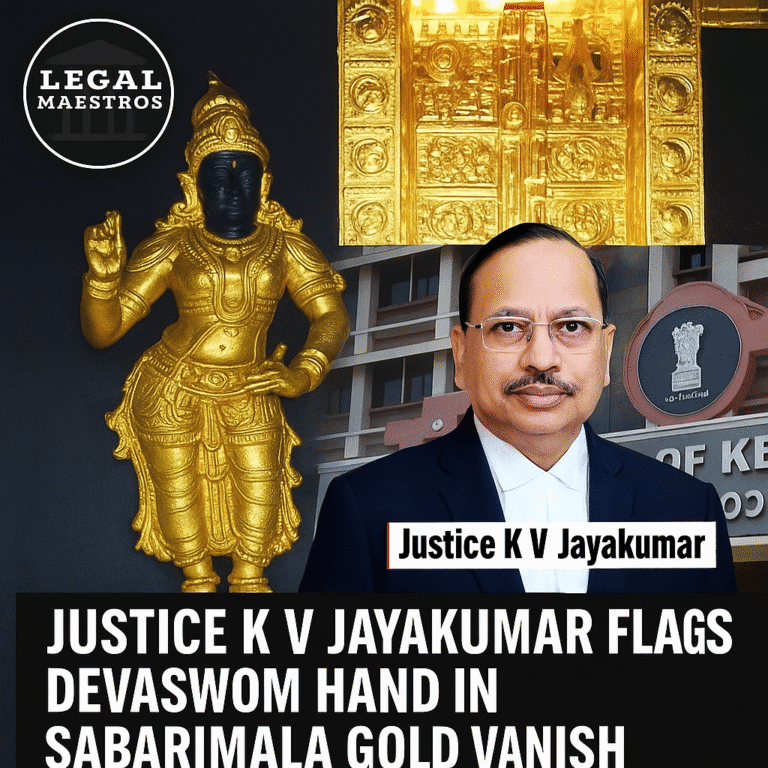
CJI B R Gavai Led Supreme Court Collegium Proposes Elevation of Three High Court Judges to Supreme Court
Introductory remarks
The Supreme Court of India, in the case of Amol Bhagwan Nehul vs. State of Maharashtra and Others, issued a landmark ruling on May 26, 2025, which defined the law regarding charges of rape based on promises of marriage.
This judgment was important since it was delivered. The court decided that if two consenting adults are involved in a romantic relationship, the simple act of not fulfilling a promise of marriage does not automatically result in charges under Section 376 of the Indian Penal Code (IPC).
This is the case unless it can be demonstrated beyond a reasonable doubt that the consent for sexual intercourse was obtained through deceit, coercion, or fraud. When writing for the Bench, Justice Satish Chandra Sharma outlined the legal framework that governs situations of this kind. He emphasized the significance of differentiating between actual instances of misusing trust and false charges that are made in order to abuse the judicial process.
For any queries or to publish an article or post or advertisement on our platform, do call at +91 6377460764 or email us at contact@legalmaestros.com.
The Context of the Case and the Existing Facts
Amol Bhagwan Nehul, a student of agriculture who was 23 years old at the time, was implicated in the case. He was in a relationship with a lady who had got a divorce and was living with her kid on the premises.
In her lawsuit, the lady claims that Amol engaged in sexual contact with her on several occasions, despite the fact that he had falsely assured her that they would be married.
For any queries or to publish an article or post or advertisement on our platform, do call at +91 6377460764 or email us at contact@legalmaestros.com.
In addition to this, she said that he had subsequently separated himself from her, borrowed money, and utilized her automobile for his own benefits. It had been approximately thirteen months after the claimed occurrences when the complaint was filed.
The other side of the argument is that Amol refuted all of the charges and said that the connection was voluntary. The complainant allegedly harassed him, followed him to his college, and threatened to accuse him in a fictitious rape case, according to the statements submitted by the individual.
In addition, his father filed a complaint with the police that was not cognizable, saying that the complainant had harassed him and threatened him.
For any queries or to publish an article or post or advertisement on our platform, do call at +91 6377460764 or email us at contact@legalmaestros.com.
For More Updates & Regular Notes Join Our Whats App Group (https://chat.whatsapp.com/DkucckgAEJbCtXwXr2yIt0) and Telegram Group ( https://t.me/legalmaestroeducators )
Provisions of a Legal Nature at Play
Section 376 (rape), Section 376(2)(n) (repeated rape), Section 377 (unnatural sex), Section 504 (intentional insult with intent to cause disturbance of peace), and Section 506 (criminal intimidation) of the Indian Penal Code were among the major accusations that were brought against those who were accused of committing the offenses.
The First Information Report (FIR) was challenged by Amol before the High Court of Bombay. This was done in accordance with Section 482 of the Code of Criminal Procedure (CrPC), which gives High Courts the authority to prevent misuse of the legal process. However, the plea by him was denied by the High Court. He then filed an appeal with the Supreme Court.
For any queries or to publish an article or post or advertisement on our platform, do call at +91 6377460764 or email us at contact@legalmaestros.com.
Principal Concerns That Were Taken Into Account|
The question of whether or not the criminal prosecution against Amol should be permitted to proceed; or whether or not it was an abuse of legal provisions, was brought before the Supreme Court for consideration. Whether or whether the complainant’s agreement for sexual intercourse was based on a deliberate false promise of marriage, which would incur criminal culpability under Section 376 of the Indian Penal Code, was the primary question that needed to be taken into consideration.
In addition, the court was required to determine whether or not there was any evidence to back up the charges of criminal intimidation or unnatural sex, as well as whether or not the whole behavior of the complainant supported her assertions.
“The Meaning of Consent According to Section 90 of the Indian Penal Code”
The Court said that it is essential to have a clear understanding of what constitutes valid consent. A permission that is granted out of fear or owing to a misunderstanding of the facts is not considered legitimate, according to Section 90 of the Indian Penal Code.
For any queries or to publish an article or post or advertisement on our platform, do call at +91 6377460764 or email us at contact@legalmaestros.com.
In situations of claimed rape that include fraudulent promises of marriage, the courts have repeatedly maintained that in order for the promise to be considered evidence of rape, it must be false from the very beginning, and the male must have had no intention of marrying the woman from the very beginning.
The Supreme Court of the United States said that the connection between the two persons was one that was voluntary, that it lasted for more than a year, and that it consisted of a number of meetings, trips, and stays at lodges. There was no evidence to suggest that Amol, with the goal of misleading the complainant into a sexual connection, made a false promise of marriage to an individual.
This complaint was filed late and there was a lack of evidence.
The court also took note of the fact that the filing of the FIR occurred more than a year after the purported first occurrence. During this time period, the individuals who filed the complaint maintained their connection, which included going on trips together and staying together on many occasions.
For any queries or to publish an article or post or advertisement on our platform, do call at +91 6377460764 or email us at contact@legalmaestros.com.
In addition to the absence of any medical proof or other indications of compulsion, this delay made it difficult to determine whether or not the charges were credible.
In addition, there was no evidence to suggest that Amol had perpetrated criminal intimidation or issued threats. After reviewing the evidence, the court came to the conclusion that the complainant had freely entered into a relationship with the appellant, and that the evidence did not support charges under Sections 376, 377, 504, or 506 of the Indian Penal Code.
The Bhajan Lal Guidelines, on Which We Rely
The Court made reference to the seminal decision that was handed down in the case of State of Haryana vs. Bhajan Lal, which established standards for the dismissal of First Information Reports (FIRs) under Section 482 of the Criminal Procedure Code.
For any queries or to publish an article or post or advertisement on our platform, do call at +91 6377460764 or email us at contact@legalmaestros.com.
A category that was highlighted in the case of Bhajan Lal is the situation in which the charges included in the FIR are so ludicrous or fundamentally unlikely that no reasonable person could come to the conclusion that an offense has been committed.
Amol’s complaint was deemed to fall under the Bhajan Lal categories, particularly those relating to mala fide purpose and misuse of the judicial process, according to the Court’s application of this concept throughout the investigation.
An Observation Regarding the Misuse of the Laws Regarding Rape
It was pointed out by Justice Satish Chandra Sharma that while laws that protect women from sexual abuse are necessary, the misuse of these laws may have severe repercussions, particularly upon young people.
For any queries or to publish an article or post or advertisement on our platform, do call at +91 6377460764 or email us at contact@legalmaestros.com.
In the verdict, it was emphasized that every failed relationship or broken promise of marriage should not be treated as a criminal offense alone. It is not always appropriate to pursue legal action in the aftermath of a love relationship, even if it ends in a negative manner, unless there is strong proof of lying or coercion.
As an increasing trend, the Court has voiced concern about the use of rape allegations as a weapon in failed relationships. This not only places a strain on the judicial system, but it also does harm to the accused person’s image and future prospects. The Court cautioned that this kind of exploitation undermines the credibility of really legitimate concerns.
Decision of the Court in Final Form|
The ruling of the High Court was overturned by the Supreme Court, and the First Information Report (FIR) and all procedures against Amol were thrown out. This was done after taking into consideration the circumstances, the absence of proof, the delay in making the complaint, and the mature age of both people involved. ‘
For any queries or to publish an article or post or advertisement on our platform, do call at +91 6377460764 or email us at contact@legalmaestros.com.
The court put a strong emphasis on the fact that continuing with the trial would not accomplish anything and would be unfair to a young guy who still has his whole life ahead of him.
Last but not least
A major reminder of the need of rigorous inspection in instances involving claims of sexual offenses based on promises of marriage is provided by the decision that was handed down in the case of Amol Bhagwan Nehul vs the State of Maharashtra.
This concept, which states that consent must be evaluated in light of the whole relationship and behavior of the persons concerned, was reaffirmed by the Supreme Court. The decision preserves the equilibrium that exists between shielding persons against false charges that include the abuse of legal instruments and respecting the rights of women.
For any queries or to publish an article or post or advertisement on our platform, do call at +91 6377460764 or email us at contact@legalmaestros.com.
This case emphasizes the significance of making responsible use of the criminal justice system and reinforces the essential role that the courts play in protecting individuals against malicious prosecution.
At the same time, it highlights the need of having a mature legal knowledge of consent, relationships, and the boundaries of criminal law in cases that involve personal and emotional judgments between adults.




![Research Assistantship @ Sahibnoor Singh Sindhu, [Remote; Stipend of Rs. 7.5k; Dec 2025 & Jan 2026]: Apply by Nov 14, 2025!](https://legalmaestros.com/wp-content/uploads/2025/11/Gemini_Generated_Image_s0k4u6s0k4u6s0k4-768x707.png)
![Karanjawala & Co Hiring Freshers for Legal Counsel [Immediate Joining; Full Time Position in Delhi]: Apply Now!](https://legalmaestros.com/wp-content/uploads/2025/11/Gemini_Generated_Image_52f8mg52f8mg52f8-768x711.png)
![Part-Time Legal Associate / Legal Intern @ Juris at Work [Remote]: Apply Now!](https://legalmaestros.com/wp-content/uploads/2025/11/ChatGPT-Image-Nov-12-2025-08_08_41-PM-768x768.png)
![JOB POST: Legal Content Manager at Lawctopus [3-7 Years PQE; Salary Upto Rs. 70k; Remote]: Rolling Applications!](https://legalmaestros.com/wp-content/uploads/2025/11/ChatGPT-Image-Nov-12-2025-08_01_56-PM-768x768.png)